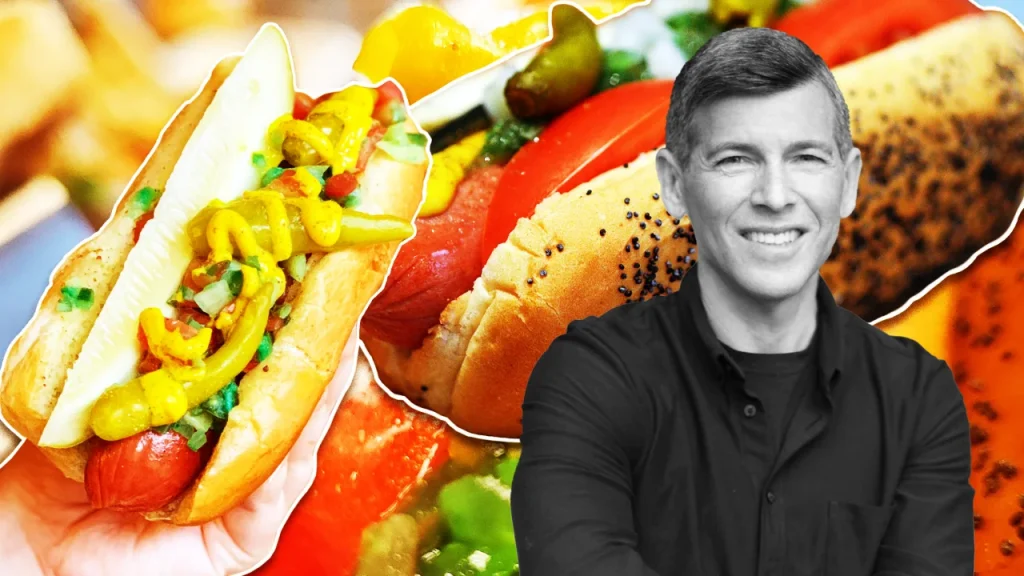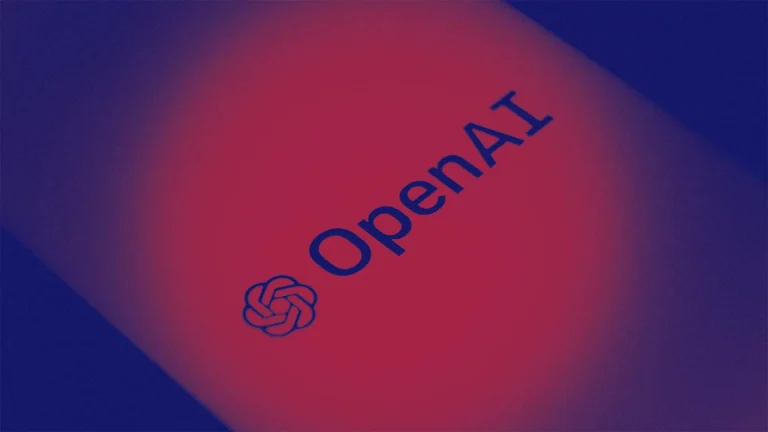
It’s two hours to tipoff between the Orlando Magic and Philadelphia 76ers when I meet Andy Lansing in an executive-level conference room at the Kia Center. A side door swings open and in walks a chef, touting an oversized cutting board lined with two rows of wagyu beef hot dogs—one with just mustard (never ketchup, says Lansing), the other garnished with a mango salsa for a little local Florida flare.
This is why we came, I think. The Hot Dog King needs his fix.
A diet high in hot dog
Lansing might be the most interesting CEO in America. He heads Levy Restaurants, a 50,000-employee, $4 billion hospitality company that leads culinary operations for more than 250 sports and entertainment venues globally. Lansing visits them all, spending most of his time on the road, assuring food quality and innovation and meeting field team members and partners along the way. In his travels, he sometimes eats up to 10 hot dogs per week, fulfilling the tradition of eating one at each venue. He wakes up at 3:30 a.m. every morning to work out, even on the road, rotating between strength and HIIT training, running, and yoga.
“I wish I loved working out,” Lansing says as we put our hot dogs down and embark on the rest of our food tour. “That would make it so much easier. But I’m religious about it because I have to be. A lot of people exercise for different reasons—mental, whatever it is. I just exercise so I can eat.”

Part foodie, part C-suite exec, Lansing obsesses over food quality far beyond hot dogs, as Levy is the architect of everything from the snack stands on the concourse to the most elevated dining experiences in some of the world’s most iconic venues. The company has more than 60 team partners across major American sports—the NBA, MLB, NFL, NHL, and MLS—including the Chiefs’ Arrowhead Stadium, which hosts this weekend’s AFC Championship Game. It also partners with 25 college athletic programs.
“Levy is really the coolest story,” Lansing says. “I think this year will be $4 billion in revenue or something, and I don’t think we’ve even hit our stride yet. I don’t even think we’re even close to having grown up.”
An unlikely giant
It’s 1978, and two brothers, Larry and Mark Levy, want to invest in a restaurant. They found a small deli in Chicago’s Water Tower Place called D. B. Kaplan’s Delicatessen that was looking for investors, and they became partners. After about six months, the owner decided to close the struggling deli. The brothers were on the verge of losing their investment. So they offered to step in and run the restaurant themselves. With no culinary or entrepreneurial experience, the brothers’ first order of business was to call their most trusted advisor.
Their mom.
Eadie Levy, in her late 50s and living in St. Louis, moved to Chicago, bringing along family recipes for matzo ball soup, potato salad, blintzes, and more. “Within two weeks of her being there, the food went from being barely acceptable to being a big hit,” Larry Levy said.

In 1982, as the popularity of Mrs. Levy’s Delicatessen exploded and the brand expanded, the Chicago White Sox were building a new experience of their own down the road at Comiskey Park. They were selling premium tickets for sky boxes, and they wanted a premium dining experience to match. They asked the Levy brothers if they would cater the sky boxes. Feeling even further out of their depth than normal, they declined. But the Sox kept coming back. Eventually, the brothers caved, and they constructed a rag-tag operation where they would drive around and bring fried chicken from one restaurant, ribs from another, and deliver it all to the sky boxes at Comiskey with restaurant-quality service.
The Chicago major leagues
“People were blown away,” Lansing says. “They were expecting shit food and we were giving them really good food and servers who were trained in the restaurants. So the Sox were actually really smart because, at the time, nobody was thinking like this. Nobody was offering premium food experiences at stadiums.”
Before long, the Cubs came calling. They wanted to offer the same experience at Wrigley Field. The Chiefs wanted it at Arrowhead. “It just blew up,” Lansing says.

Competing vendors also took notice. Levy focused solely on premium dining, not just hot dogs and basic concessions. So its competitors, seeing an opportunity, pitched teams the idea of working with one operator for all concessions, basic and premium. You want one kitchen, they pleaded. It’s so much easier to deal with only one operator.

Levy’s response to the teams: They’re right. One operator is so much more efficient. “But would you rather have the crab cake and tenderloin guys doing the hot dog and beer, or the other way around?”
So the teams gave Levy the exclusive operator accounts to handle food and beverage across the board.
An accidental CEO
It’s 90 minutes to tipoff and we’ve reached the concourse for the second leg of the Levy food tour. I’m realizing that Lansing has cultivated a strange brand of selective fame. We stopped to visit multiple offices en route to the concourse, our small group growing as we move through the venue. As we patrol the concourse, fans slow down and point, wondering who Lansing is to receive this guided, white-glove tour. They don’t recognize his face, he’s too short to be a player—maybe he’s part of the ownership group?
They stare, envious, as we settle at our second tasting station, a circular counter off the main concourse, lined with lobster rolls, smash burgers, and ice cream.
Lansing never wanted to be a restaurateur. His dream was to be a sports agent. In 1988, at age 26, he was living that dream, earning a law degree and building a roster of five NFL athletes, anchored by the Miami Dolphins’ “Marks Brothers,” Mark Clayton and Mark Duper. He was well-connected in the Chicago legal scene, which led a friend, who worked in Levy’s marketing department, to call on him for help. The company was looking for a new Vice President of General Council. Lansing met with Larry Levy to give recommendations. After explaining the role to Lansing, Levy asked, “Would you be interested?”
“No, no, no,” Lansing recalls saying. “I love what I do. I’m happy with my athletes.”
“Well,” Levy said, “you should think about it.”
Not an idiot
The following week, Lansing sent Levy some names to consider. He then received a call from his friend in Levy’s marketing department, who had set up the initial meeting.
“You’re an idiot,” she said.
“Well, I hear that often,” he replied. “But why are you saying it now?”
Levy had been parading 40- and 50-year-old candidates through his office, when It was clear to her that he really wanted to hire the young Lansing. She pleaded with him to meet with Levy one more time to discuss the role, and reluctantly, he did. “I wasn’t playing hard to get, Lansing says. “I just didn’t want the job.”
Lansing remembers Levy’s final plea.
“This will be my last time,” Levy said. “You should do this.”
“Larry, it’s so nice of you,” Lansing said. “But why?”
“Because the difference between successful people and really successful people,“ Levy said, “is that really successful people see an opportunity and they take it, because they know it’s never going to come again. This is one of those opportunities.”
A revolving door
That was on a Friday. Lansing asked Levy to give him the weekend. Leaving the building, there was a revolving door. As he stepped into the first part of the door, he recalls thinking that maybe Levy was right, he should do it. By the time he emerged on the street, he had changed his mind. How could he do this? Was he an idiot?
He flip-flopped through the weekend, and come Monday—without knowing why to this day—he accepted the role.

What followed was “the worst case of imposter syndrome imaginable,” Lansing says. Levy would ask him about trademark law, of which he knew nothing. So he learned it. And as he learned the nuances of how the company operated, naturally curious, he began asking questions. Why did they buy seven different olive oils? Couldn’t they get a better price if they only bought one or two? That led Levy to task Lansing with setting up a purchasing department. His inquiries on the HR side led him to create that department. Soon, Lansing was working more on the business side than the law side, prompting a move to business development and, eventually, succeeding Levy as CEO in 2004.
“Never in a million years did I think this is what I would be doing,” Lansing says. “It’s just dumb luck.”
Restaurant moneyball
It’s one hour to tipoff and we’ve made our way to another part of the increasingly crowded concourse and another tasting. Tacos, pork bao buns, and onion ring stacks—the latter of which I understood. But tacos? Bao buns? This was not standard game day fare. It was also restaurant-quality, both in taste and presentation. It was what I’d expect from any upscale cantina or Asian fusion spot.

These items are products of E15, Levy’s data and analytics company, which Lansing launched in 2014. The concept came directly from Lansing being on the ground, talking with key members at each venue. He noticed that when they had rolled out a new item or concept, when he asked how it was going, the answer was invariably the same. “It didn’t matter if I was in New York or Phoenix,” he said. “The answer was always, ‘It’s doing pretty well.’” But what did that mean? If they sold 350 tacos in one night, should it have been 450? Or 250?

“In their defense, they didn’t come up having to answer those questions,” Lansing says. “So I finally made the connection with Moneyball and decided that the answer was data. It’s analytics. And I knew that the company needed to move from an anecdotal-based organization to an empirical-based organization.”
A case study
Lansing’s team has a concession at a venue in St. Louis that was ready to be revamped. His team wanted to try out a new Italian beef sandwich concept. But first, E15 did some research. They analyzed ticketing data to create avatars of ideal fans, identified what food and restaurants people who fit these avatars locally were posting on social, where they were eating outside the stadium, and what they were buying at grocery stores. They concluded that the concept should not be Italian beef.
It should be Asian.
Not only should it be Asian, but the cilantro index in St. Louis was off the charts, so the menu should feature mostly items with some cilantro presence.
It was a concept Lansing’s hadn’t even considered, yet when they opened, the line was around the corner. “I’ve never seen anything like it,” Lansing said.
And true to his previous initiatives, Lansing didn’t want to do the data thing halfway. He didn’t want finance guys moonlighting as E15 data personnel. So they hired a dedicated CEO, data scientists, and mathematicians—all for a company that makes food.
”We created a whole new organization,” he says. “I don’t want to get rid of our guts because we have really good guts. That’s why we’re doing so well. But if we can bring some left brain thinking to complement the right brain, it becomes an amazing tool.”
When they launched E15, Lansing’s message to the new CEO was simple.
“You have one goal,” he said. “To make me feel like an idiot every day.”
A childhood sense of wonder
It’s 30 minutes to tipoff and we’ve made our way down to the Icon Lounge, the swankiest of the Kia Center’s VIP experiences. The wooden architecture and soft lighting give it an upscale jazz club vibe as a who’s who of executive suite and courtside ticketholders lounge around over craft cocktails. Lansing and I talk over plates of freshly sliced New York strip steak with truffle butter, a luxurious exclamation point to our tour.
“I’m a magic geek,” he says. At first, I think he means a fanatic for the hometown team, but I quickly course-correct. “When people come to my office I’ll have a deck of cards out, or I’ll do something big at a company meeting. I just think it’s cool.”
“We’re all born with a sense of wonder,” he says. “How do birds fly? Why is the sky blue? And when we get older, we lose our sense of wonder because we figured it all out. We know the answers. What magic does is … it reawakens that. To me, it returns us to our childhood sense of wonder.”
Lansing is a performer—the guy who, in high school, would toggle between the athletic field and the auditorium stage. Today, he’s the star of the annual company awards show. For the last 15 years, he has hosted the black-tie event that celebrates the company’s top performers. Between awards, it’s a variety show of sorts, featuring employees showcasing their talents. Lansing recalls a bartender from Austin who is “one of the greatest singers I’ve ever seen,” and a server from Los Angeles who also performs a set. “It’s like Broadway-quality stuff,” he says.
Every year make it more outrageous
They also play pre-recorded skits, featuring Lansing. One year, he dressed up as a character from the musical CATS and took to Times Square. This year, the Levy team took a cue from Lansing’s favorite show, Impractical Jokers—a show that puts characters in real-life situations and feeds them lines through an earpiece. In this skit, Lansing pretended to pitch a new restaurant concept to a live focus group, fueled by ridiculous lines from his team behind the scenes.
“I wasn’t born with that gene that says don’t make an idiot out of yourself,” Lansing says. “So every year they try to make it more outrageous.”
Not taking himself too seriously is at the core of Lansing’s operating system, as is staying close to his childhood sense of wonder and maintaining a pulse of what it means to be a restaurateur at a fundamental level. It’s one of the reasons Levy still operates a collection of award-winning restaurants that stretches from Disney World in Orlando, to Chicago, to Los Angeles and spans fine dining, elevated sports bar fare, modern American, Italian, French, seafood, and more. According to Lansing, it’s how the company stays in touch with consumer trends and the fundamentals of hospitality.
“I think that the restaurant business keeps us humble,” he says. “Like, in the restaurant business, I’m slugging it out every night to try to get people to come to my restaurant because there are so many choices. I think that’s a restaurateur’s mentality, not that of somebody sitting in a corporate office. Why does the guy in the corner office care if the sauce for the onion rings is too garlicky? He doesn’t give a shit. By the way … he doesn’t even know.”
A bucket list of global events
It’s two minutes to tipoff and the Icon Club has thinned out, but is far from empty. Magic legend Tracy McGrady is in the house, among a smattering of other former players and local celebrities. Even after tipoff, the club remains the most exclusive real estate in the building.
The year is off to a busy start for Lansing, and it’s not going to slow down. Levy properties have already hosted multiple NFL playoff games and multiple college football bowl games, including the national championship. And coming up, it has the Grammy Awards, hosted at the Crypto.com Arena in L.A., followed by the Daytona 500. “If there’s a major event, we probably do it,” Lansing says. “The Kentucky Derby, the U.S. Open (tennis), we just got the Emmy’s, and my kids think I’m so cool because we do Coachella.”
At halftime, Lansing ditches the Icon Lounge for his courtside digs, two seats down from the Magic bench. He’s attended a bucket list of events. He’s been to both a Cubs and White Sox World Series and he saw his beloved Michigan Wolverines beat Alabama in the Rose Bowl en route to last year’s National Championship. For a Chicago guy and a Michigan Man, that’s tough to beat. And he’s done it all while leading Levy to meteoric growth during his 20-plus years as CEO.
Eight airplanes a week
“I think part of the key to my success, if you want to call it that—part of the key to the company’s success—is that I am on eight airplanes a week so I can to be in our operations,” Lansing says. “The most important thing I can do is be in the locations, look at the product, talk about the uniforms, and taste the food. And these guys have never heard me once say, ‘What’s your margin?’ or, ‘What’s your profitability?’ Somebody else can do that. I just want to know how the food tastes.”
The intersection of sports and hospitality has grown into a cultural phenomenon. Sixty-two percent of consumers consider food options to be highly important when attending a sports event or concert. And Levy, led by Lansing, is doing its best to deliver on that, scaling into luxury culinary experiences while keeping its focus on the basics of hospitality. “It’s amazing,” says Lansing. “We design these clubs for a high-end food and beverage experience, and at the end of the day, even the richest people that come in here—all they really want is a great hot dog.”






